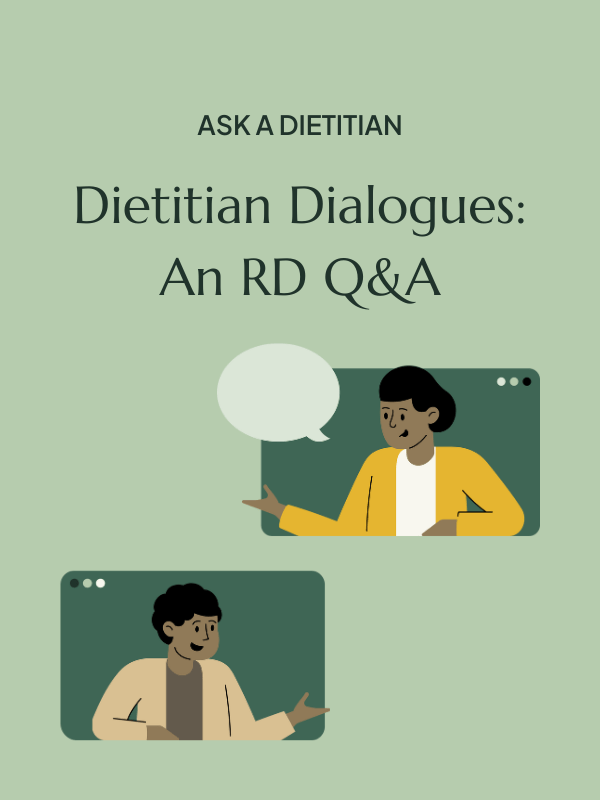If you’re following current health news, then you’ve definitely read the word “inflammation”—and how these days, many experts connect chronic inflammation to disorders and diseases that emerge later in life. Inflammation can also intensify the spectrum and severity of symptoms in autoimmune disorders, such as Crohn’s disease, Lupus, and Rheumatoid Arthritis.
The good news? There are certain eating patterns we can follow to reduce inflammation, the risk for chronic disease and improvement in autoimmune disorders. To discuss this, we tapped Jan Zimmerman, MS, RDN, CDN and registered dietitian at Culina Health, to break down how nutrition can support lowering inflammation and strengthen your immune system, reduce your risk of chronic disease and improve autoimmune health. Read on to learn more!
About Jan Zimmerman, MS, RDN, CDN

Can you share a little about your path to becoming a registered dietitian (RD)? Why did this field interest you?
My relationship with food began early as an overweight kid, struggling for years with restrictive diets and yo-yo weight loss. I decided to become an RD to learn about the science of food and nutrition, what works, how and why. I love being a RD and nutrition therapist, and consider it a privilege to partner with patients in creating new food and self-care habits on their journey towards feeling better, healing, and achieving their health goals.
Why have anti-inflammatory nutrition practices become a focus for you?
My first RD job was as an HIV nutrition specialist, before AIDS medications were available. It was a scary time. Many patients were struggling with poor appetite, diarrhea, fatigue, pain and wasting syndromes. I saw firsthand the huge impact of food on digestion, energy, mental health and survival. I came to learn that specific food components produce cellular reactions that are either pro-inflammatory or anti inflammatory, and that chronic inflammation wreaks havoc on the immune system and immune response. Armed with diet and nutrition tools, I began practicing a “food as medicine” approach, helping patients to choose foods that can dampen rather than promote an inflammatory response. I use this approach to prevent and treat chronic diseases, including auto-immune disorders such as Crohn’s disease, Lupus, and Rheumatoid Arthritis.
About Inflammation
Why is controlling inflammation so important for health?
Inflammation is a normal part of our body’s response to injuries and invaders, like germs or injuries. Depending on the strength of your immune system, inflammation can promote healing and recovery. But when your immune system is not in good shape, when there’s no injury or invader, left unchecked, chronic inflammation can lead to a variety of health conditions, including heart disease, high blood pressure, cancer, chronic pain, type 2 diabetes, anxiety, depression and dementia.
What about anti-inflammatory medication?
There are over 100 NSAIDs (non-steroid anti-inflammatory drugs) such as Advil and Motrin on the market that are helpful for short-term use, commonly for pain from fever, cold, flu, and arthritis. Some chronic pain and inflammation as seen in auto-immune disorders are usually treated with hard hitting steroid-based medications, each with their own spectrum of side effects and toxicity. Using food and nutrition can be a powerful tool in an arsenal to fight inflammation and medication side effects.
Working with an RD to reduce inflammation
What are the common ways you support patients with chronic inflammation or auto-immune disorders?
First, I assess eating patterns. Many people living with chronic illness, and especially autoimmune disease, have chronic pain, fatigue, and low appetite. Crohn’s disease is more complicated with the inflammation located in the gut. Their hunger cues are usually way off, and many don’t eat much all day. Among other things, their body is starving, even if they don’t have an appetite or feel hunger. We create a goal to improve eating patterns and develop food strategies that are easy, appealing and achievable. Often, hunger cues revive once patients once patients begin to feed themselves regularly.
Then, I assess the overall quality of someone’s diet. I look to increase the anti-inflammatory foods through an anti-inflammatory diet and reduce the foods that promote inflammation. I don’t believe in deprivation, so depending on the patient’s history, diet, and individual preferences, we create goals that are specific and achievable.
What are the most common autoimmune disorders you see in patients, and are there any patterns in their symptoms?
The most frequent autoimmune diseases I see are Crohn’s disease, Lupus, and Rheumatoid Arthritis. Among these patients, I often see patterns of digestive imbalance, poor appetite and diet, chronic fatigue, chronic pain, and depression.
Can you share an anecdote about a patient who was struggling with autoimmune concerns or inflammation and how you helped them?
My patient had been living with Crohn’s disease for many years, was getting a medication infusion every 8 weeks and was eating a very limited, restrictive diet and experiencing nutrient deficiencies. While the medications helped with pain management, she was always tired, depressed, and had no appetite. She was barely eating one full meal per day and her intake was very low in protein, calories and several micronutrients, including Vit D, Calcium and Magnesium. I recommended she eat something small with protein and a healthy carb within two hours of waking up. We developed a goal named “Morning Snack” instead of “Breakfast” because the latter sounded too big and overwhelming for her. We brainstormed morning snack ideas to support her goal, including anti inflammatory foods that she used to enjoy,
- Oatmeal with walnuts, berries, and chia seeds
- Low-fat yogurt with cinnamon, walnuts, berries
- 1 egg with whole wheat toast and kiwi
- Smoothie made with soy, frozen fruit, protein powder
By our next session, she reported starting to look forward to her morning snack and was feeling a little better, and had more energy during the day. Next, we looked at developing options for lunch, including batch cooking and freezing soups containing anti-inflammatory vegetables and proteins. After which she added a piece of fruit for an afternoon snack. She also began to take a daily high potency multivitamin, Vit D, Calcium/Magnesium.
l see this patient monthly, and am happy to report she has much better energy, is sleeping better, feels less depressed, and is enjoying trying new anti-inflammatory recipes!
How can nutrition support people concerned about inflammation or auto-immune disorders?
Nutrition support can help people concerned about inflammation by focusing on these areas of their nutrition and lifestyle:
First, by improving digestion. I often say, happy tummy, happy life! The largest organ of our immune system, our gut is directly linked to the brain. You can work with an RD to identify certain foods and sources of fiber for your specific GI issues and symptoms to support your overall gut health and promote beneficial gut bacteria.
You can also combat inflammation by eating more anti-inflammatory foods, like salmon, quinoa, sweet potatoes, onions, garlic, red peppers, walnuts, chia seeds, kiwifruit, berries, apples, arugula, spinach, broccoli, beets—and by eating fewer inflammatory food like processed and fatty meats, refined carbs, full-fat dairy, and unhealthy fats like commercial, hydrogenated oils.
Managing stress is also crucial—you can reduce inflammation by tending to your mental health and emotional relationship to food, hunger and fullness cues. Some tips I often give clients to reach these goals include:
- Eat within 2 hours of waking up, don’t wait to feel hungry.
- Eat 3-4 small meals each day.
- Use fruit and/or nuts as an afternoon snack.
- Be mindful of eating too fast and eating too much at meals and snacking.
- Stay hydrated, get enough sleep, and prioritize time for joyful movement.
Your anti-inflammatory grocery list
Vegetables and Fruit
I like to tell my clients that the best diet is to “eat the rainbow!” A variety of colors and types of vegetables are so powerful at combating inflammation. Fresh or frozen berries, leafy greens, carrots, peppers, tomatoes, and more! Even garlic and onions, which often play a supporting role in recipes, are great sources of anti-inflammatory nutrients.
Protein
If you eat animal protein, go for fish, lean beef or pork, eggs, low-fat dairy, chicken, turkey, and fish. Plant-based proteins like soy products, beans, legumes, nuts, seeds, and peas are all wonderful at combating inflammation.
Carbs
Whole grains such as quinoa, rolled oats, whole wheat bread & pasta, brown rice all support a healthy immune system, digestive balance and reduce inflammation.
Healthy Fats
Healthy fats, many of which are rich in omega 3 fatty acids, are powerful inflammation-fighters. Go nuts for walnuts, pumpkin & sunflower seeds. Eat avocados, or use avocado oil for cooking and baking. Enjoy fatty fish, like salmon, sardines, and trout—fresh or canned both work! Snack on olives, or use olive or avocado oil for salad dressings.
Herbs and Spices
Herbs and spices not only supercharge your home cooking with flavor, but they also fight systemic inflammation! You can get them fresh, grated, ground, in tea, or in supplement form. Turmeric, ginger, cinnamon, and rosemary are all delicious sources of anti-inflammatory compounds.
Jan’s Takeaways on Anti-Inflammatory Eating
Are there any common misconceptions about inflammation you want to address?
Misconception #1: All inflammation is bad
Reality: Not always. Inflammation is a natural, often healing response to injury/illness. When you get a paper cut, or twist your ankle, or have a sore throat, for example. Your inflammatory response kicks in to repair your injury or illness. It becomes a problem when your immune system cannot cycle back down and recover, often due to either poor diet, chronic stress, poor sleep or genetic predisposition that produces most auto-immune disorders
Misconception #2: An anti-inflammatory diet can be a quick fix to lose weight
Reality: Anti-inflammatory eating is a lifestyle, and it’s a marathon—not a sprint. Yes, it can be associated with weight loss (among all the other amazing benefits), but the long-term benefits are so much greater and far-reaching. The beauty of the anti-inflammatory diet is that there are so many foods that support fighting chronic inflammation that you can tailor it to your specific preferences and enjoy a wide range of foods.
Misconception #3: To fight inflammation, you have cut out all the “fun” stuff: sweets, burgers, bacon, fries, soda
Reality: While it is true that you must eat much less of these above foods, it’s also true that full deprivation or restriction is never effective, and often results in someone abandoning their desires to feel better altogether. Instead, I recommend enjoying some of these foods with much more moderation, while finding anti-inflammatory foods you enjoy to fill your diet with. You’ll be so focused on how great you feel, you’ll likely stop reaching for the pro-inflammatory stuff on your own!
Misconception #4: Gluten is inflammatory to everyone
Reality: Gluten is inflammatory to those with diagnosed celiac disease or inflammatory bowel disease/IBS with sensitivity to digesting Fructans (gluten starch). However, eating a lower-carb diet generally offers more anti-inflammatory benefits. If you are eating carbs, go for whole grains which have anti-inflammatory benefits, vs. refined carbs which are pro-inflammatory.
What are your top takeaways for people struggling with chronic inflammation and/or an autoimmune condition?
- Be sure to start every day with breakfast or a “morning snack” within 2 hours of waking up.
- Eat foods like walnuts, berries, kiwifruit and dark greens (arugula, baby kale, spinach) every day; Fatty fish like salmon 2x per week; Try quinoa 2x per week.
- Address your stress: Try deep breathing, meditation app, talk to a friend, or see a therapist.
- Add joyful, easy movement to your days—find what works for you and feels sustainable!
Work with a Culina Health Registered Dietitian
Whether you’re looking to heal from chronic inflammation or a chronic condition, seeking ways to support your immune function, or wanting tips on how to eat in a more healthful way, Culina Health is here for you. Get tailored advice that’s sustainable and attainable to make lasting changes for your health and wellbeing. Book your first session today—many of our patients pay $0 out of pocket or a regular copay with insurance!





